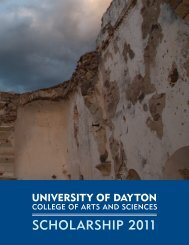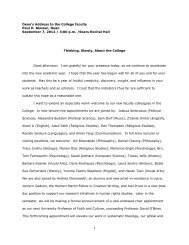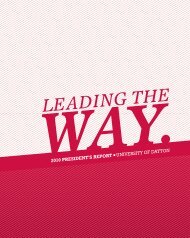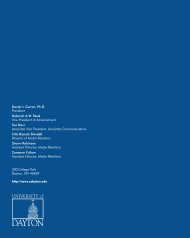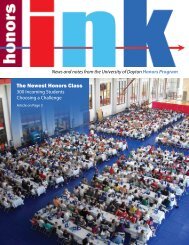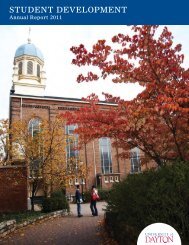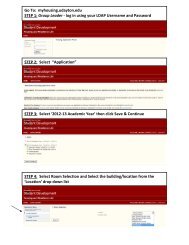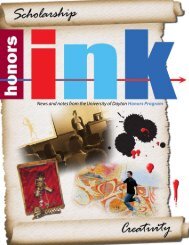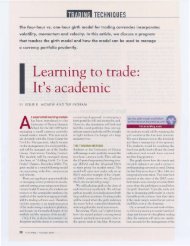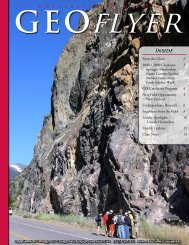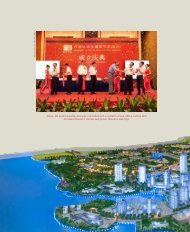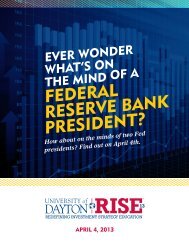Stander Symposium abstract book - University of Dayton
Stander Symposium abstract book - University of Dayton
Stander Symposium abstract book - University of Dayton
Create successful ePaper yourself
Turn your PDF publications into a flip-book with our unique Google optimized e-Paper software.
ORAL PRESENTATIONS<br />
POLITICAL SCIENCE<br />
Making Money and Making a Difference in Malawi, Africa.<br />
Presenter(s): Hillary A Cook, Allison M Varricchio<br />
Advisor(s): Jason L Pierce<br />
Political Science<br />
1:00 PM-1:20 PM<br />
Independent Research Kennedy Union - 312<br />
Maji Zuwa is a newly established NGO in Malawi, Africa that aims to operate as a pr<strong>of</strong>itable economic empowerment lodge while enabling<br />
sustainable development within the surrounding villages. Maji Zuwa, meaning water and sun, operates as a social entrepreneurship enterprise<br />
that encompasses a lodge where vacationers, students, and service groups can visit for an atypical travel experience. Maji Zuwa also operates a<br />
non-pr<strong>of</strong>it organization, Determined to Develop, a registered 501(c)(3), to lift Malawians out <strong>of</strong> poverty through grassroots development projects.<br />
The goal <strong>of</strong> Maji Zuwa is to empower Malawian people to live a life <strong>of</strong> dignity without providing handouts to those in need. This paper assesses the<br />
effectiveness <strong>of</strong> Maji Zuwa in meeting its goals and utilizing its resources to promote development. The researchersÂÂ conducted ethnographic<br />
field research in Malawi and collected over forty interviews with individuals directly impacted by the developmental projects carried out by Maji<br />
Zuwa. The findings suggest that since Maji Zuwa is in its preliminary stages <strong>of</strong> operating as an NGO, it does not have the resources, specifically<br />
monetary, to successfully promote sustainable development in the region. However, in time Maji Zuwa will receive the necessary domestic and<br />
international support to promote development.<br />
Slavery through the Ages; An Historical Narrative on Bondage and Ideology and the<br />
Institution <strong>of</strong> Slavery Today<br />
Presenter(s): Rebecca M Elderkin<br />
Advisor(s): Dorian Borbonus, Anthony N Talbott<br />
Political Science<br />
1:00 PM-1:20 PM<br />
Course Project, 11_FA_POL_300_04 Kennedy Union - 311<br />
The purpose <strong>of</strong> this research is to identify major categories in which slavery in the West is defined in order to create a historical narrative on the institution<br />
<strong>of</strong> slavery. This narrative will end with contemporary slavery, whereby history and historiography will be used to frame the way in which<br />
slavery is popularly thought <strong>of</strong> today. The study will briefly cover slavery during five major time periods; the purpose <strong>of</strong> chronological separation<br />
is to illustrate how slavery influenced each <strong>of</strong> these societies and how each society influenced the institution <strong>of</strong> slavery. The first time period will<br />
be antiquity, covering what is known <strong>of</strong> slavery in ancient Greece and Rome. Second, medieval slavery will be compared to ancient slavery and be<br />
analyzed as a precursor for the third era, the <strong>of</strong>t referred “Enlightenment era.” Here, focus will be on the contrast between popular literacy and the<br />
reality and tenacity <strong>of</strong> the institution <strong>of</strong> slavery. The fourth era will be narrowed to civil controversy over slavery in the United States. Finally, the<br />
fifth period is the modern-era, wherein twenty-seven million slaves exist, a larger number than any other period in history.<br />
U.S. Foreign Policy in an Era <strong>of</strong> Change<br />
Presenter(s): Maria Alarcon Garcia del Real, Alex K Antony, Chin Yi Chen, Lindsey E Cummings, Timothy J<br />
Finnigan, Amanda L Fioritto, Brian P Focareto, Scott Fogel, Belmari Gonzalez,<br />
Nuria Eugenia Gonzalez Pedrol, John E McGinnis, Erika C Morris, Sandra Rodriguez Pintor<br />
Advisor(s): Margaret P Karns<br />
Political Science<br />
1:00 PM-4:00 PM<br />
Course Project, 12_SP_POL_408_01 Marianist Hall Learning Space - 217<br />
The rise <strong>of</strong> emerging powers such as China and India and the effects <strong>of</strong> the wars in Iraq and Afghanistan, the 2008 global financial crisis, and high<br />
budget deficits have created a number <strong>of</strong> challenges for US foreign policy in responding to these changes. This series <strong>of</strong> research presentations<br />
will examine some <strong>of</strong> those challenges and analyze factors that have shaped specific US foreign policy decisions. One group <strong>of</strong> presentations will<br />
concern responses to “Drug Trafficking and Violence in Mexico” as well as “The Leftward Turn in Latin America” and “Cuba and the Continuing US<br />
Embargo.” A second set <strong>of</strong> presentations will focus on “The US and Pakistan,” The US and the Palestinians,” “The US and the Egyptian Revolution <strong>of</strong><br />
2011,” “Comparing the US Decisions to Invade and Withdraw from Iraq,” and “The US and Reconstruction in Iraq.” The third group <strong>of</strong> presentations<br />
119



